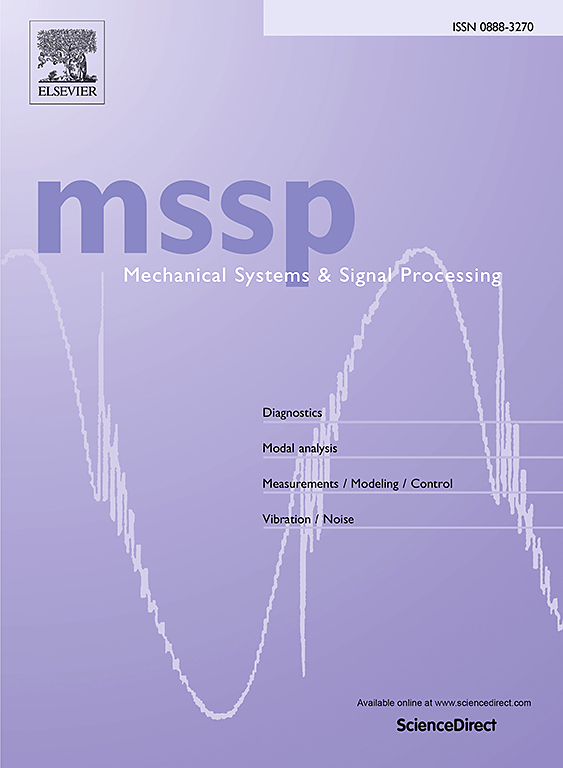Influence of additional mass and connection of nonlinear energy sinks on vibration reduction performance
IF 7.9
1区 工程技术
Q1 ENGINEERING, MECHANICAL
引用次数: 0
Abstract
The broadband vibration reduction performance of nonlinear energy sink (NES) has attracted wide attention. However, the impact of the NES’s additional mass other than the oscillator and how it is connected to the primary structure has been ignored. More recently, it has been discovered that vibration attenuation through the cellular application of NES can achieve greater efficiency. However, the connection between NES cells and the primary structure, as well as between cells, has not been studied. In this study, by considering the additional mass of the NES cells, the influence of the connection modes of NES cells on the vibration reduction efficiency is investigated theoretically, optimally and experimentally for the first time. The forced vibration models of linear oscillator coupled with NES cells are established by viscoelastic connection and rigid connection respectively. The approximate analysis and numerical analysis show that the vibration reduction efficiency of NES cells is affected by the resonance frequency of the primary structure and the external excitation intensity and shows a nonlinear trend. With the change of the resonant frequency of the primary structure, the viscoelastic connection NES cells can almost always obtain higher vibration reduction efficiency than the rigid connection NES cells. The global bifurcation results show that the strongly modulated responses of the structure can be triggered by the viscoelastic connection. Moreover, the connection modes between NES cells also affect the vibration reduction efficiency. The optimal parameters of the connection damping and connection stiffness are obtained by the particle swarm optimization algorithm. Finally, the viscoelastic connection and rigid connection, and the effect of the connection mode between NES cells on the vibration reduction efficiency are compared by experiments. The conclusions of theoretical research are verified. This work can provide theoretical guidance for the engineering application of NES cells.附加质量和非线性能量汇的连接对减振性能的影响
非线性能量汇(NES)的宽带减振性能已引起广泛关注。然而,NES 除振荡器外的附加质量及其与主结构的连接方式所产生的影响一直被忽视。最近,人们发现通过 NES 单元应用来减弱振动可以实现更高的效率。然而,NES 单元与主结构之间以及单元与单元之间的连接尚未得到研究。在本研究中,通过考虑 NES 单元的附加质量,首次从理论、优化和实验方面研究了 NES 单元的连接模式对减振效率的影响。通过粘弹性连接和刚性连接,分别建立了与 NES 单元耦合的线性振子的受迫振动模型。近似分析和数值分析表明,NES 电池的减振效率受主结构共振频率和外部激励强度的影响,并呈现非线性趋势。随着主结构共振频率的变化,粘弹性连接 NES 单元几乎总能获得比刚性连接 NES 单元更高的减振效率。全局分岔结果表明,粘弹性连接可以触发结构的强调制响应。此外,NES 单元之间的连接模式也会影响减振效率。通过粒子群优化算法获得了连接阻尼和连接刚度的最佳参数。最后,通过实验比较了粘弹性连接和刚性连接以及 NES 单元之间的连接模式对减振效率的影响。验证了理论研究的结论。这项工作可为 NES 单元的工程应用提供理论指导。
本文章由计算机程序翻译,如有差异,请以英文原文为准。
求助全文
约1分钟内获得全文
求助全文
来源期刊

Mechanical Systems and Signal Processing
工程技术-工程:机械
CiteScore
14.80
自引率
13.10%
发文量
1183
审稿时长
5.4 months
期刊介绍:
Journal Name: Mechanical Systems and Signal Processing (MSSP)
Interdisciplinary Focus:
Mechanical, Aerospace, and Civil Engineering
Purpose:Reporting scientific advancements of the highest quality
Arising from new techniques in sensing, instrumentation, signal processing, modelling, and control of dynamic systems
 求助内容:
求助内容: 应助结果提醒方式:
应助结果提醒方式:


